
The Plantae Job Center - November 2, 2018
Blog, Careers, Careers - Blog
Internship Posts:
Undergraduate Summer Research Experience Program, Center for Engineering MechanoBiology (CEMB), Philapelphia, PA, USA
Biochemist Intern - Trait Discovery (199253W-01), DuPont Pioneer, Johnston, IA, USA
PhD student in Hydrology & Climate…

Genetic Basis of Natural Variation of Rice Ionomics
Blog, The Plant Cell, The Plant Cell: News(Translated from the Chinese original http://news.hzau.edu.cn/2018/1101/52991.shtml)
Nanhu News Network (Correspondent Sheng Ke)
On October 30th, the research group of Professor Tian Xingming from the Rice Science Team of the National Key Laboratory of Crop Genetic Improvement of our School…

Editorial: The challenge of the post-truth era (Nature Chem Biol)
Plant Science Research WeeklyWhy do people persist in thinking that climate change is not happening, or that vaccines cause autism? Scientists need to find better ways to communicate about what we do. In this editorial from Nature Cell Biology, the authors point to the low achievement level of US high school students (and those…
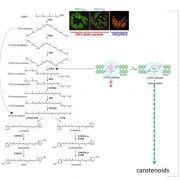
Review: Changing form and function through carotenoids and synthetic biology (Plant Physiol)
Plant Science Research WeeklyPlants produce hundreds of carotenoids with functions ranging from photoprotection to signalling, and with important roles in human health as well. Wurtzel describes opportunities arising from applying the tools of synthetic biology to carotenoids. The regulation of carotenoid biosynthesis is complex,…
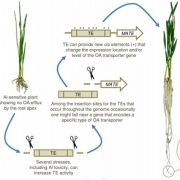
Review: Transposable elements have role in aluminum resistance (J Exp Bot)
Plant Science Research WeeklyPhytotoxic aluminum can drastically harm plant roots, leading to decreased nutrient uptake, water absorption and yields. Many plant species efflux organic anions into the rhizosphere to reduce the toxic effects of aluminum. Some of the genes that encode transporter proteins which mediate organic anion…
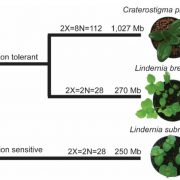
Desiccation tolerance evolved through gene duplication and network rewiring in Lindernia (Plant Cell)
Plant Science Research WeeklyDesiccation tolerance is the property of being able to survive and recover from extreme dehydration. Although there are many desiccation-tolerant plant species, efforts to identify the genetic basis of desiccation tolerance have been limited by a lack of closely-related desiccation sensitive species.…
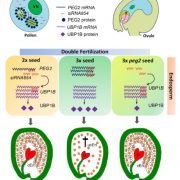
The imprinted gene PEG2 acts as a sponge for the transposon-derived siRNA854, inducing postzygotic reproductive isolation (Devel. Cell)
Plant Science Research WeeklyClosely related species that have different numbers of chromosomes (e.g., 2n versus 4n) are reproductively isolated, and this can arise as a consequence of an unbalancing in the expression levels of maternally- and paternally-imprinted genes. Wang et al. have identified a fascinating mechanism that explains…
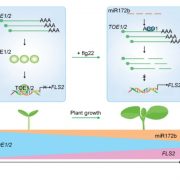
Transcriptional regulation of the immune receptor FLS2 controls the ontogeny of plant innate immunity (Plant Cell)
Plant Science Research WeeklyFLS2 is a well-known cell-surface receptor that triggers plant immune response. Zou et al. asked whether its expression level is age-dependent, and found that FLS2 is expressed at very low levels in newly-emerged seedlings. They identified two closely related transcription factors TOE1 and TOE2 that…
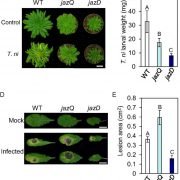
JAZ repressors of metabolic defense promote growth and reproductive fitness in Arabidopsis (Proc. Natl. Acad. Sci. USA)
Plant Science Research WeeklyJasmonates promote defense reponses but at the expense of growth. JAZ proteins repress jasmonate responses. Guo et al. examined the consequences of knocking out 10 of the 13 JAZ genes in Arabidopsis, by producing a jaz decuple, or jazD mutant. They compared jazD mutant to previously described jazQ mutants…

